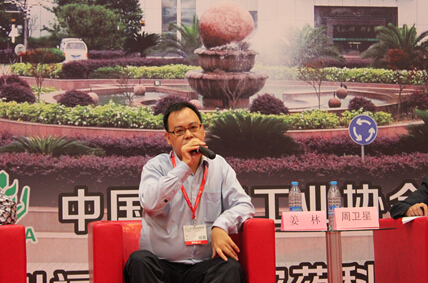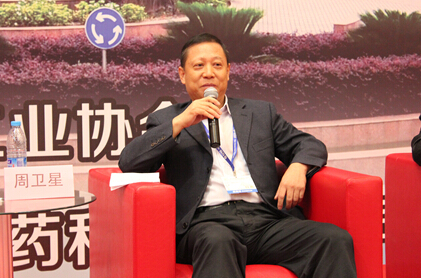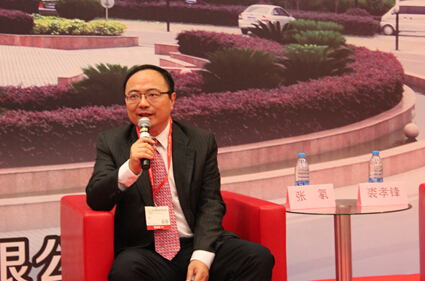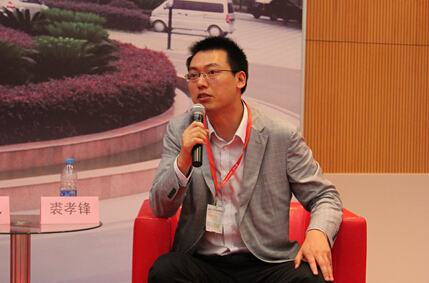

The market price of glyphosate in China seemed not to meet people’s expectation in 2014. The price of glyphosate once increased to RMB45000 per tonne in 2013. However afterwards, the price kept going down to the current level, RMB27000 per tonne. The market went to into a stagnant state again.
At the Fuhua Forum of the 2014 AgroChemEx Conference, Giants of glyphosate production, industrial analysts and international buyers convened in Shanghai and shared their ideas on the development of the Chinese glyphosate industry.
Fuhua: Aiming to produce 300,000 tonnes of glyphosate annually

Jiang Lin, Vice President of Fuhua Tong-da Agro-chemical Technology Co., Ltd. (hereinafter referred to as Fuhua)
Jiang Lin, Vice President of Fuhua, introduced that by the end of this October, Fuhua has produced over 100,000 tonnes of glyphosate, and the annual output of 120,000 tonnes of glyphosate will be realized at the end of the year. Fuhua has made significant achievements in technological renovations and currently Fuhua is implementing the plan for capacity expansion on current factory, which will elevate the current annual output of 120,000 tonnes of glyphosate up to 180,000 tonnes. Mr. Jiang believes that the capacity-expansion-on-current-factory plan requires less investment. He said, “Fuhua aims to realize an annual output of 300,000 tonnes of glyphosate.” The extra annual output of 120,000 tonnes of glyphosate is a new project on another site. The project site is located in Chongqing Chemical Industrial Park. At present, the acquisition of 1,500 acres of land has been finished and it is expected that Fuhua will complete building an overall annual production capacity of 300,000 tonnes of glyphosate in 2016.
According to Mr. Jiang, targeting at glyphosate, Fuhua will be installed with 19 sets of large-scaled equipment. In order to produce 300,000 tonnes of glyphosate annually, Fuhua has to produce 600,000 tonnes of caustic soda each year. Mr. Jiang said the production of glyphosate did not require too much investment, but it required billions of RMB to install the 19 sets of equipment. Fuhua also benefits from other advantages, such as there are cheap coal, halogen, and phosphorite mines in Leshan, logistics channels along the Yangtze River, high-speed rails from Leshan to Chengdu, etc.
Fuhua will spare no efforts in making full use of the materials and turn them into profits. Mr. Jiang said, “Even if we didn’t earn a dime from producing glyphosate, we would still make hundreds of millions of RMB from these 19 sets of equipment.” Currently, Fuhua has already finished 85% of the whole industrial chain of glyphosate production and it is expected that construction of all the equipment will be completed next year.
Wynca: Making innovations to prolong the life cycle of glyphosate

Zhou Weixing, General Manager of the Agrochemical Division of Zhejiang Wynca Chemical Industrial Group Co., Ltd. (hereinafter referred to as Wynca)
Zhou Weixing, General Manager of the Agrochemical Division of Wynca believes that there is still development room for the glyphosate market. As predicted by research institutes, the market demand for glyphosate will reach one million tonnes by 2017.
Meanwhile, Mr. Zhou also pointed out the many issues existing in the glyphosate industry.
First, resistance to glyphosate becomes increasingly remarkable. There are a total of 28 varieties of weeds over the world which have acquired resistance to glyphosate; the resistance problems for horseweed herb and carpet grass in China have also become quite serious.
Secondly, glyphosate couldn’t meet the requirements arising from the relationship between the market demand for glyphosate and its economic value. Currently, there are a number of problems existing in the production process of glyphosate, including the effective utilization of phosphorus reaching only around 60%. Large quantities of waste will be produced alongside the production process of glyphosate. How the phosphorus could be fully used and how the waste should be dealt with? Solution of these problems is of vital importance for a sustainable development of glyphosate industry.
Thirdly, disordered production and overcapacity problems exist in the glyphosate industry.
Fourthly, massive use of glyphosate will possibly bring harm to human beings. As alleged by Brazil, countries in Africa and other countries, the use of glyphosate will bring harm to human beings’ kidney, which brought the voice for a ban on glyphosate. Though these questions alarm the glyphosate industry, scientific studies are needed to prove the authenticity of these queries.
How to revitalize the old product glyphosate and make it develop in a sustainable way? Mr. Zhou believes that the key is to renovate, including innovations on product profiles, formulations, and recycling economy, etc.
Shanghai Freemen Chemicals: Things don’t occur as people wish
Shanghai Freemen Chemicals Co., Ltd. is a trade company which emphasizes on developing the oversea market. Zhang Dong, General Manager of Shanghai Freeman Chemicals, looks at the glyphosate market from the perspective of a dealer. Mr. Zhang talked about the glyphosate market in the following three aspects, “First, currently, the life cycle of glyphosate will last a considerably long period. The competition at present is only adjustment among the capacities. The dealers and end users of glyphosate indeed don’t want to see a chaotic situation.”
“Secondly, the farmers hope properties of the product could clear up confusions for them, including the resistance to glyphosate. We hope that the pesticide manufactures could practically solve the problems met by the farmers during cultivation; otherwise, even if the product sells at a low price, it will pollute the environment when applied in the fields.”
“Thirdly, it is expected that there will be lasting competition for the price of glyphosate, but the supply of glyphosate will maintain stable.”

Zhang Dong, General Manager of Shanghai Freemen Chemicals Co., Ltd.
According to Mr. Zhang, it’s diversified competition between the two glyphosate manufacturers Fuhua and Wynca. Zhang hopes that the whole glyphosate industry will shape up an innovative competition mode, in which the manufacturers compete with each other on different levels and therefore they will gain benefits from different value chains. This way the whole industry will embrace a brighter future.
Analyst: It is inevitable to integrate and upgrade the glyphosate industry
Qiu Xiaofeng, Chief Analyst of China Galaxy Securities talked about glyphosate outside the box of glyphosate. Mr. Qiu said, there is disordered competition in all industries of China, while in developed countries, there are only five to six enterprises in each industry. He analyzed that there are two reasons which contributed to the disordered and vicious competition: first, after the entry to the WTO, China has been involved in the global division of labor and thus introduced a large part of the world’s mid- and low-end manufacturing industries to the country. The barriers against competition are easy to override; secondly, evaluation of local officials’ performance is based on the growth of GDP, which has led many mid- and low-end manufacturing industries in for the local governments believe that we could also do this if others could. These two reasons have made China’s manufacturing industries quite dispersed and brought fierce competition of mid- and low-end among the industries.

Qiu Xiaofeng, Chief Analyst of China Galaxy Securities
Mr. Qiu analyzed that as China strengthens its efforts in supervising environmental regulation, environmental protection arbitrage between regions will gradually vanish in the future. Therefore, the manufacturers will do their best to settle the environmental issues in order to survive. Mr. Qiu believes that the overcapacity problem for the glyphosate industry is quite serious, through industry reshuffle including cooperation and price competition, there will be six or seven glyphosate manufacturers at most in the future.